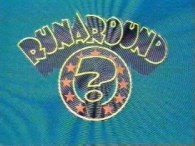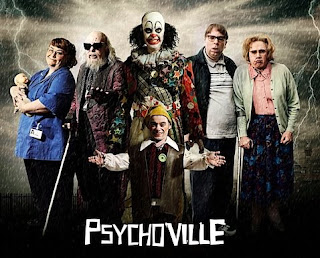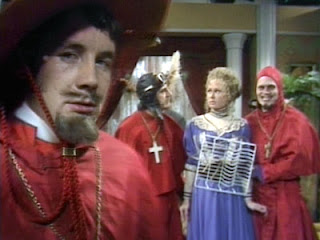 Back in 1981, I was a contestant on the children’s TV quiz show Runaround. That’s right, m’dears, at the tender age of 10, I first saw the heady heights of fame… or, at least, was on a networked TV programme.
Back in 1981, I was a contestant on the children’s TV quiz show Runaround. That’s right, m’dears, at the tender age of 10, I first saw the heady heights of fame… or, at least, was on a networked TV programme.
For those of you who don’t remember Runaround, it was essentially a multiple-choice quiz; a question was asked, with the possible answers shown on the wall at the far side of the studio. When the host – Mike ‘Frank Butcher off EastEnders‘ Reid shouted “G-g-g-g-g-g-g-go!”, the contestants would run across the studio and stand in front of the answer they thought was correct. After a few seconds in which you could change your mind, the answer was revealed by a light being shone on the contestants who’d got it right. If you got it wrong, you went into the ‘Sin Bin’, and were out of the game until… er, I forget, but if you got it right, you picked up a coloured ball. The contestant with the most balls at the end of the show was the winner.
Look, I know it sounds basic, but it was a simpler time, all right? We didn’t have crack cocaine and Nintendo iPlaypods, we had to make do with simpler pleasures.
Anyway, this was all filmed at the Southampton studios of now-defunct regional broadcasters Southern Television. To get contestants, they’d come to nearby schools and ask a number of questions – I, strangely enough, got in because I was able to show I had a name beginning with a certain letter of the alphabet, and also had a particular number of pets at home. I didn’t lie about either of these things, but I probably could have. Still, they weren’t looking for Mastermind contestants, I guess, just kids who could read and run, so the entry requirements weren’t too stringent. Eventually, they had enough contestants from the school (four or five, I think), and a date was set.
The day itself was pretty exciting – we were given a bit of a tour of the building (peeping into a room where they were recording something for How), and taken down to the studio where we’d be filming that afternoon. It was a pretty big studio, and so they filled it was coachloads of schoolkids from the surrounding area, including the schools the contestants were drawn from. Then there was a bit of hanging around, and we changed into our specially-personalised Runaround t-shirts and went down for the filming. To say I was excited was an understatement.
At the start of the show, the contestants (the four or five from my school, plus an opposing team from another school, though it was more about trying to win for yourself than any kind of team effort) would run out through a tunnel-shaped opening, and so as the filming began, we were lined up in the tunnel. And this is the point where I make my torrid confession, here on the interweb, to you. Have you ever been in a TV studio, maybe to watch the filming of a show? Well, if you have, you may have seen a lot of the cameras have small spiral-bound pads clipped to them, giving the camera operators a rundown of the places to focus on, etc. In the tunnel before the show started, there was a camera, and on the running order there I could see that for the first question (about how many days there are in July, I think) answer B was circled.
Yes, I’m not proud of it, but I went for B on the first question, and it was indeed correct. I cheated. Not a good thing…
… but there was pretty much instant karma, as I quickly got the next question wrong and spent a lot of time in the Sin Bin, and didn’t come anywhere near winning, so verily cheats did not prosper that day. And rightly so. Who knows how different it might have been if I’d got the first question wrong?
Anyway, whilst I didn’t win the top prize – a portable TV – when it came to the tiebreaker between two boys from the other school, I did have my first insight into the wanton trickery of the televisual medium; the tiebreak question was “What is the fourth month of the year?” and it took them about seven guesses to get it right, but when the show was broadcast, the boy who won appeared to have replied pretty much instantaneously. Oh, television editing, you are misleading.
My prize, for those of you who are interested, was a then-top-of-the-line digital watch; which meant that it told the time, date, and – brace yourself – seconds. About five years later, it was pretty much the sort of watch they’d give you free if you bought £5 worth of petrol, but that’s the march of progress for you.
So, having learned a salutary lesson about cheating, I made my way home, with my watch, Mike Reid’s autograph on the back of one of the question cards (we moved house several months later, and it was lost in the move), and of course my personalised Runaround t-shirt.
Speaking of which, writing about the experience has inspired me to dig out the t-shirt and put it on for old times’ sake. Of course, I was a lot smaller then, but let’s see if I can still get into it…

…Oh.
Looks like I’ve grown a bit in the last 28 years, then.








